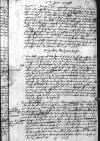Das sich E(wer) E(rbarkei)t entschuldiget, / worum(m)b die ein zceit lang nicht geschribn(n), / ist unnotig, / weil uns derselbt(en) anlig(en) uffentlicher ist, dan es superinscribed⌈eses superinscribed⌉ uns liebet, / alse nemlich der gewonten superinscribed⌈gewontengewonten superinscribed⌉, alt(en) swacheit halben(n), dar aus ... illegible⌈...... illegible⌉ E(wer) E(rbarkei)t ... illegible⌈...... illegible⌉ erlediget zu sein superinscribed in place of crossed-out ...⌈... illegible⌈...... illegible⌉seinsein superinscribed in place of crossed-out ...⌉ / uns nichts were angenemers etc. Es hot sich fast wol getroff(en), / den hildenheimschn(n) handel hie mit dem edlen, / wolgeborn(n) h(ern) Stanisław Kostka (*1487 – †1555), as a leader of the so-called nobles' party active in Royal Prussia since 1536, Kostka stood in opposition to most of the members of the Council of Royal Prussia, who wanted to maintain the autonomy of the province and a "balance of power" in terms of governance. The tension between the Prussian Subtreasurer and the Council had been increasing since the Diet in Graudenz (Grudziądz) in 1533. Kostka, connected with the royal court since his youth, was sent to Graudenz as the King's deputy and, contrary to custom, decided to take part in the proceedings. In response to such a step, the Council members stopped the meeting. Kostka accused them of hostility towards the Poles and intervened on this matter at the court. In the absence of the then Bishop of Ermland (Mauritius Ferber) it was Dantiscus who chaired the Graudenz Diet. The incident badly harmed his future relationships with Kostka; 1531-1555 Treasurer of the Prussian lands and Treasurer of Marienburg (Malbork); 1544-1545 Castellan of Elbing (Elbląg), 1545-1546 Castellan of Kulm (Chełmno); 1546-1549 Vice-Voivode of Kulm; 1546-1551 Voivode of Pomerania; 1551-1555 Voivode of Kulm (PSB 14, p. 356; Urzędnicy 5/2, p. 216; MAŁŁEK 1976, p. 119-123)⌊elbingschn(n) castellan(n)Stanisław Kostka (*1487 – †1555), as a leader of the so-called nobles' party active in Royal Prussia since 1536, Kostka stood in opposition to most of the members of the Council of Royal Prussia, who wanted to maintain the autonomy of the province and a "balance of power" in terms of governance. The tension between the Prussian Subtreasurer and the Council had been increasing since the Diet in Graudenz (Grudziądz) in 1533. Kostka, connected with the royal court since his youth, was sent to Graudenz as the King's deputy and, contrary to custom, decided to take part in the proceedings. In response to such a step, the Council members stopped the meeting. Kostka accused them of hostility towards the Poles and intervened on this matter at the court. In the absence of the then Bishop of Ermland (Mauritius Ferber) it was Dantiscus who chaired the Graudenz Diet. The incident badly harmed his future relationships with Kostka; 1531-1555 Treasurer of the Prussian lands and Treasurer of Marienburg (Malbork); 1544-1545 Castellan of Elbing (Elbląg), 1545-1546 Castellan of Kulm (Chełmno); 1546-1549 Vice-Voivode of Kulm; 1546-1551 Voivode of Pomerania; 1551-1555 Voivode of Kulm (PSB 14, p. 356; Urzędnicy 5/2, p. 216; MAŁŁEK 1976, p. 119-123)⌋, disser lande koniglichem schaczmeister, / zu bereden(n). / Was der wegen(n) under uns entslossen(n), wirt E(wer) E(rbarkei)t unser lib(e)r bruder Georg von Höfen (Georg Flachsbinder, Georgius de Curiis) (†after 1550-02-07), Ioannes Dantiscus' brother; Starosta of Rössel (HARTMANN 1525-1550, No. 584, 586, 588; AGAD, MK, 77, f. 385-386v)⌊JorgGeorg von Höfen (Georg Flachsbinder, Georgius de Curiis) (†after 1550-02-07), Ioannes Dantiscus' brother; Starosta of Rössel (HARTMANN 1525-1550, No. 584, 586, 588; AGAD, MK, 77, f. 385-386v)⌋ anczeig(en). Das E(wer) E(rbarkei)t derhalbn(n) von Thorn (Toruń, Thorunium), city in northern Poland, on the Vistula river in its lower reaches, main residence of the bishops of Kulm (Chełmno); one of the three Great Prussian Cities (along with Gdańsk and Elbing) which had representatives in the Council of Royal Prussia; a member of the Hanseatic League⌊Thorn(n)Thorn (Toruń, Thorunium), city in northern Poland, on the Vistula river in its lower reaches, main residence of the bishops of Kulm (Chełmno); one of the three Great Prussian Cities (along with Gdańsk and Elbing) which had representatives in the Council of Royal Prussia; a member of the Hanseatic League⌋ ist angesprochen(n), / hot nichts uff sich. Die ampter tragen, / oder mit pflicht iren h(e)rn vorbund(en) sein, / mussen kein superinscribed in place of crossed-out ...⌈... illegible⌈...... illegible⌉keinkein superinscribed in place of crossed-out ...⌉ personen ansehen(n) etc. Newes ist zu disser zceit nichts bey uns. / Was E(wer) E(rbarkei)t wirt zukomen(n), / bitt(en) uns ... illegible⌈...... illegible⌉ nicht zuvorhalt(en), / dergleichn(n) von uns ouch sol geschen(n). / Hiemit gotlichn(n) gnod(en) in langwerig(e)r gesuntheit befoln(n). /

 AAWO, AB, D. 7, f. 47r (t.p.)
AAWO, AB, D. 7, f. 47r (t.p.)